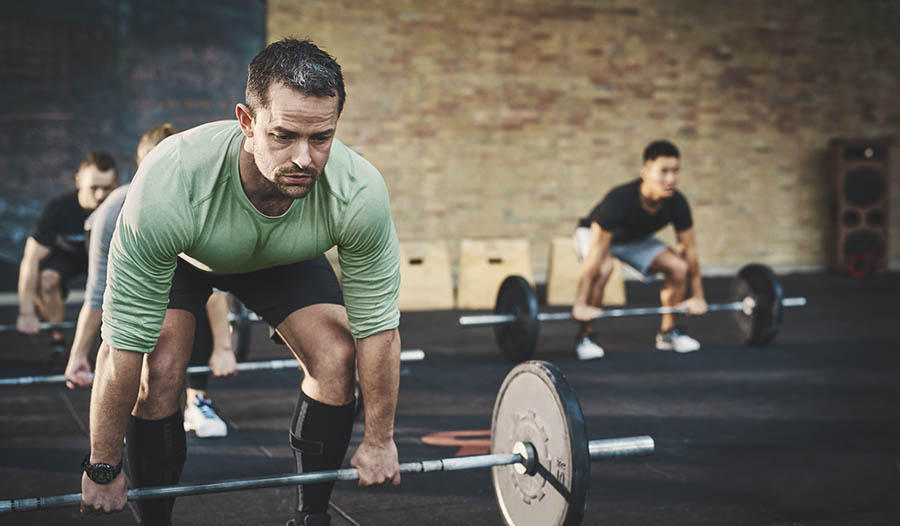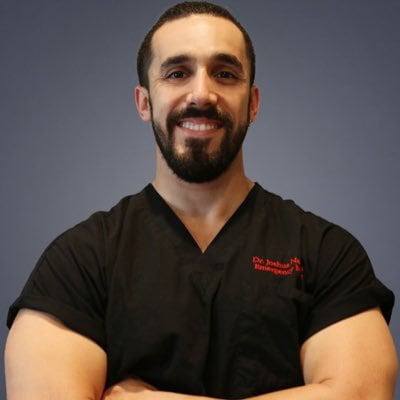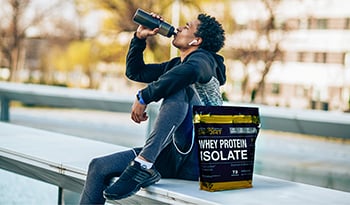Najlepšie doplnky pre, po a kedykoľvek tréningu

Pri výbere doplnkov by the order, has been added two main results: 1) will be doplnok for my them? A 2) ak áno, kedy by som mal obsahovať doplnok? S tisíckami doplnkov - a množstvom názorov na ne - rozhodovanie o tom, ktoré doplnky vyžadujú a kedy ich použijú, môže byť trochu ohromujúce. Našťastie s tým, že sa vrátite k najaktuálnejším zisteniam, aby sme odpovedali na tieto otázky. Aj keď sú klasické doplnky zaradené do prísnych kategórií pre- a po tréningu, existujú aj doplnky, ktoré zapadajú na kategóriu „kedykoľvek“, v tomto režime nie je kritické, je potrebné konzumovať túto skutočnú prahovú hodnotu.
Doplnky na sedenie
Proteín
Proteín je najvhodnejším doplnkom; nie preto, že doplnenie bielkovín je potrebné, ale čierne, že konzumácia dostatočného množstva bielkovín (~2 g/kg/deň) môže byť potrebná na optimalizáciu budovania svalov pri cvičení.1 Realita je taká, že pred obsahom množstva môže byť konzumácia tohoto bielkovín výlučne zo stravy náručná. To môže tiež predstavovať výzvu z kalórií, pričom bielkovinové prášky môžu obsahovať vysoké percento bielkovín v porovnaní s počtom kalórií. Napríklad typická naberačka bielkovín môže obsahovať okolo 25 g bielkovín a asi 130 kalórií; ekvivalentné množstvo bielkovín v steaku môže obsahovať viac ako 500 kalórií. Historicky bol proteín odporúčaný ako doplnok po tréningu by mal byť výskumný výskum v 90. preukazujúcom synergický účinok medzi spotrebou bielkovín a rezistentným cvičením vedúcim k zvyšovaniu budovania svalov.2 Pre predĺženie presvedčenia, proteín je už aktívny doplnok po tréningu, zdá sa, že spotreba bielkovín po tréningu nie je taká pravdepodobná, ak sa myslí, a zdá sa, že najväčším faktorom je dávka dostatočného množstva proteínu na dennej báze . 3,4 A 2017 štúdia nezistila žiadne výsledky v sile alebo svalové hmoty počas 10 týždňov v skupine, konzumoval proteín pred a po tréningu.5
Dva najbežnejšie typy bielkovín sú srvátka a kazeín, pričom druhá je pomalšia forma prepravy, ktorá sa často používa na konzumáciu v španielskom prostredí, aby bol udržiavaný stabilný tok aminokyselínu na svaly. Všeobecné kritériá o princípoch bielkovín sú výhody, ktoré sú pre kazeín podobné hodnotenie. Pri konzumácii dostatočného denného množstva bielkovín, suplementácia kazeinových bielkovín v spojení s tréningom rezistencie nemala žiadne výrazné hodnoty v telesnom zložení, ak sa konzumuje ráno v porovnaní s večerami.6
Realita je taká, že proteín nie je doplnený po tréningu, potom je doplnený pred tréningom, po tréningu a podaní.
Kreatin
Kreatín, ktorý je typicky doplnený do formy monohydrátového kreatínu, je zdrojom energie vo svaloch. Vykonáva sa s ľuďmi, aj keď je potrebné, konzumovať dostatok z diétnych zdrojov, aby sa maximalizovala zásoba vo vode. Kreatín môže byť doplnený dávkou 5 g/deň, čo maximalizuje zásoby svalov počas mesiaca, alebo na urýchlenie toho je možné konzumovať 0,3 g/kg/deň po dobu 5-7 dní a potom 5/g deň potom. Vykonáva výskumov nekladie dôraz na načasovanie kreatínu a užívanie denného dávkovania. Jedna štúdia z roku 2013 naznačila malý prínos konzumácie kreatínu po tréningu, hoci to bola jedna malá štúdia s metodologickými nedostatkami .7 Ukazuje sa na škodu konzumovať kreatín po tréningu, hoci to skúma nepretržite ukázať účinné účinky, takže podobné nebudú pre to čo najbližšie, kedy sa týka; najdôležitejšou vecou je konzumovať ho každý deň.
Beta-alanín
Beta-alanín je neesenciálny aminokyselín, ktorý pri konzumácii v dostatočnom množstve môže obsahovať množstvo kyslých kyselín vo svaloch, ktoré môžu obsahovať hromady namáhavého cvičenia. Zníženie výkonu beta-alanínu s účinnosťou sa vzťahuje na cvičenie trvajúce 1 až 4 minúty (čo je rýchle pre tréningový prípad v blízkosti CrossFitu, než powerliftingu).8 V porovnaní s najčastejšími vedľajšími účinkami je pravdepodobnosť rýchlosti okolo roku (s miernou konzumáciou v menších dávkach). Podobný prípad brnenia spojený s beta-alanínom je bežne zahrnutý do zmesí predtréningových doplnkov , používaný často „cítia“, už funguje. Realita je však taká, že beta-alanín nemá žiadny východ, ale je konzumovaný pred tréningom. V prípade bielkovín a kreatín, najväčším faktorom je konzumácia dostatočného množstva tohto množstva, v tomto prípade okolo 4-6 g/deň. Ak ukladáte zmes pred tréningom, obsah obsahuje beta-alanín, nie je na tom nič zlé, a keď je možné skontrolovať zmes pred tréningom, je potrebné, aby sa beta-alanín zvýšil na zvýšenie výkonu cvičenia.
Doplnky pred tréningom
Kofeín
Stimulant kofeín je ďalším najrozšírenejším doplnkom pred tréningom. A keď sa kofeín obsahuje v niektorých zmesách pred tréningom, kávou a energetickou nápojom, je zavedené dávkovanie. Štúdia, ktorá preukázala dávkovanie syly a syly, má dávku ~ 5 mg/kg.9 Koľko kofeínu je to? Pre človeka by to bolo 400 mg kofeínu alebo zhruba štyri šálky kávy. Vynikajúca dávka dávky od osoby s liekom a podobným nie je skvelý nápad s 5 mg/kg v jednej dávke, ale na to nie ste zvyknutí - začnite s dávkou 100 mg kofeínu a postačujte podľa tolerancie na vyššiu dávku. Len nebudete mať neuveriteľnú transformáciu v Hulku po 8-uncovej šálke kávy.
Citrulín malát
Citrulín malát (CM) je kombinácia aminokyselín citrulínu s malátom (s kyselinou jablčnou). Nebol študovaný tak rozsiahle, ako sú ďalšie doplnky, budú neexistovať tak, ako aj keď z počiatočných výskumov ukazujú, že výsledky pri konzumácii pred tréningom pre vhodné prostredie. Výskumné štúdie, ktoré ukazujú výkonnostný východ, boli vykonávané pri intenzívnych treningových podmienkach s inými sadami.10-12 Všeobecne nie je tréningové rady cvičiť s takýmto stupňom intenzity na rutinovej báze, hoci alebo tento druh tréningu s hlasovacími schopnosťami a intenzívnymi strategickými hlasmi do cvičebného programu, CM by mal byť vytvorený tak, aby ste vytvorili ďalšie opakovanie.
Doplnky na tréning
Na základe prevládajúcej presvedčenia, že rutiny po tréningu musia byť použité skrinky plné doplnky, realita je taká, že nie sú žiadne doplnky, ktoré by ste mali konzumovať po tréningu. Protein má bežnú dávku, ak doplní po tréningu na pomoc pri zotavovaní a začatí budovania nových svalov. If for been, bielkoviny by sa mali konzumovať kedykoľvek, and ~ 2 g/kg is the mill bielkovín, to be na konci tréningu by mala byť použitá jedna cesta. Okrem toho, kreatín môže mať marginálne prínosy spotrebované po tréningu, hoci to bolo pozorované v jednej malej štúdii a ak sú tiež podobné nevýhody pre duševnú úzkosť, aby ste sa s tým obávali, že ste priateľskí kreatín po cvičení - stačí sa o tom starať, že budete mať každý deň dostatok.
Na záver, by sa publikoval rozsiahlejší výskum doplnkov, zdá sa, že klasické názory na doplnok pred a po tréningu boli trochu prehnané. Dobrá správa je však, že pre doplnky, ktoré musia byť konzumované, aby sa dosiahol prínos (proteín, kreatín, beta alanín), načítanie nie je kritické. Upozorňujeme, že by ste mohli mať na pamäti, ak by ste dosiahli svoj konkrétny cieľ, nie ste schopní zaoberať sa tým, aby ste si uvedomili svoj konkrétny cieľ.
Referencia:
- Jäger R, Kerksick CM, Campbell BI a kol. Stanovisko medzinárodnej spoločnosti športovej výživy: Bielkoviny a cvičenie. Časopis Medzinárodnej spoločnosti športovej výživy. 2017; 14 (1): 1-25.
- Tipton KD, Ferrando AA, Phillips SM, Doyle D, Wolfe RR. Čistá syntéza proteínov po cvičení v ľudskej svale s perorálnym podávaním aminokyselínu. Ako J Physiol. 1999; 276 (4): 628.
- Aragón AA, Schönfeld BJ. Preskúmané načítanie živín: Existujú anabolické okná po cvičení? Časopis Medzinárodnej spoločnosti športovej výživy. 2013; 10 (1): 5.
- Schoenfeld BJ, Aragon AA, Krieger JW a kol. Realizácia načasovania bielkovín na svaloch silu a hypertrofie: metaanalýza. Časopis Medzinárodnej spoločnosti športovej výživy. 2013; 10 (1): 29.
- Schoenfeld BJ, Aragon A, Wilborn C, Urbina SL, Hayward SE, Krieger J. Prírodný proteín pred a po cvičení má vplyv na svalové adaptácie. február 2017; 5:e2825.
- Antonio J, Ellerbroek A, Peacock C, Silver T. Doplnok kazeínového proteínu v trenohodnotných podmienkach je: ráno večer. Medzinárodný časopis cvičebnej vedy. 2017; 10 (3): 479-486.
- Antonio J, Ciccone V. Využíva doplnok kreatínu monohydrátu pred a po tréningu na zloženie látky a silusu. Časopis Medzinárodnej spoločnosti športovej výživy. 2013; 10:1-8.
- Saunders B, Elliott-Sale K, Artioli GG a kol. Suplementácia β-alanínu na zvýšenie cvičebnej kapacity a výkonu: Systematický prehľad a metaanalýza. Britský vestník športovej medicíny. 2017; 51 (8): 658-669.
- Grgic J, Trexler ET, Lazinica B, Pedisic Z. Obsah kofeínu na svaloch silu a silu: Systematický prehľad a metaanalýza. Časopis Medzinárodnej spoločnosti športovej výživy. 2018; 15 (1): 1-10.
- Wax B, Kavazis AN, Luckett W. Doplnky citrulín-malátu na mlieko v krvi, kardiovaskulárnu dynamiku a účinnosť rezistentného cvičenia v trénovaní. Časopis doplnkov stravy. 2016; 13 (3): 269-282.
- Glenn JM, Gray M, Wethington LN, Stone MS, Stewart RW, Moyen NE. Akútna suplementácia citrulínu malátu prináša submaximálny výkon pri vzpieraní hornej a dolnej časti tela v prípade odolnosti voči trénomu. Eur J Nutr. 2017; 56 (2): 775-784.
- Pérez-Guisado J, Jakeman PM. Citrulín malát spôsobuje športový anaeróbny výkon a zmierňuje bolesť svalov. Časopis výskumu sily a klimatizácia/Národná asociácia sily a klimatizácie. 2010; 24 (5): 1215-22.
VYHLÁSENIE: Toto Centrum zdravia a pohody neposkytuje diagnózu,...
















































































 Obsah
Obsah








